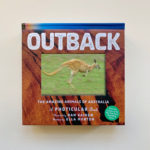 As much as you might be an admirer of the great outdoors, odds are that you are not a fan of bugs munching on your plants or skittering across your kitchen floor. Take matters into your own hands and get rid of those pests naturally without having to spray gallons of chemicals around your home and garden. As Rhonda Massingham Hart’s The Dirt Cheap Green Thumb points out, commercial pesticides, whether conventional or organic, can be expensive, and they are not always necessary. So try some of these bug controllers to get rid of the creepy-crawlies…
As much as you might be an admirer of the great outdoors, odds are that you are not a fan of bugs munching on your plants or skittering across your kitchen floor. Take matters into your own hands and get rid of those pests naturally without having to spray gallons of chemicals around your home and garden. As Rhonda Massingham Hart’s The Dirt Cheap Green Thumb points out, commercial pesticides, whether conventional or organic, can be expensive, and they are not always necessary. So try some of these bug controllers to get rid of the creepy-crawlies…
Alcohol Spray:
A spritz of alcohol wipes out mealybugs and scale. You can mix a cup of alcohol to a quart of water and spray, but a cheaper alternative is to paint straight alcohol directly on the icky critters using a cotton swab or small toothbrush.
Garlic Spray:
Garlic repels aphids, mealybugs, mites, cabbage loopers, grasshoppers, leafhoppers, and squash bugs. It inhibits fungi and even helps deter deer and mice. Add garlic to any other spray for a boost, or combine 3 or 4 ounces of minced garlic with 1 or 2 ounces of mineral oil, and let soak for at least 24 hours, add an ounce of soap then, strain and dilute 2 tablespoons of mix in a pint of water to spray. (Don’t spray over 80 degrees Fahrenheit.) Make oil-free spray by pouring just enough boiling water over a few chopped cloves to cover and steeping overnight. Strain and spray when cooled. Store in a cool, dark place and use within a week.
Boric Acid Powder:
Borax (boric acid) is a cheap solution to infestations of cockroaches, ants, fleas, and some types of beetles. Sprinkle the powder where pests are a problem. It takes a few days to work, but bugs eventually die from desiccation. Caution: Though borax is generally safe to use as a pesticide, some animal studies suggest side effects, so just in case, minimize contact.
Soap Spray:
Soap is one of the best combatants against aphids and other soft-bodied pests. Mix about 3 tablespoons of a mild laundry soap, such as Ivory Snow or an organic formula (not laundry detergent — soaps and detergents are different substances), or a tablespoon of dishwashing liquid (again, look for organic formulas; they break down quickly without harming the environment) with a gallon of water and spray on both sides of leaves. The spray only works by actually contacting the bugs; there is no residual pesticide effect. Some plants can suffer from phytotoxicity, or burning of foliage, from soaps, so it’s a good idea to test a small area first. Repeat applications can intensify plant sensitivity.





No Comments